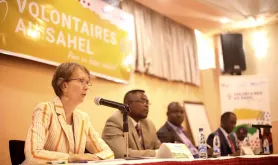One region, many crises: food insecurity, climate change, insecurity and political instability, fragile economies. As part of efforts to address those challenges, the roundtable on Volunteerism for Peace and Development in the Sahel gathered 60 participants for discussions on the strong impact of volunteerism in peacebuilding and sustainable development in the Sahel.
From 19 to 20 November 2019, stakeholders from volunteer-involving organizations, civil society, academia, governments and United Nations entities met in Ouagadougou, to discuss how volunteerism can contribute to peace and development in the Sahel region. The roundtable was initiated by the United Nations Volunteers (UNV) programme, in collaboration with the African Institute for Economic Development and Planification (IDEP) and the International Organization of La Francophonie (OIF), to produce evidence of the impact of volunteerism in the Sahel.
Coming together from different professional backgrounds and from the five G5 Sahel countries, the participants discussed the status of volunteerism and how to enhance the value of volunteering for the future.
The Sahel experience
In Burkina Faso, the current holder of the presidency of the G5, the event was closely bound to the challenging security context in the region. Despite this crisis, the value of solidarity is deeply rooted in the societies of the region, which is an important basis for volunteering. In this context, Mathieu Ciowela, Resident Representative of the United Nations Development Programme (UNDP) in Burkina Faso recalled the role of volunteers as first responders not only in times of peace but especially in a crisis.
Even in the implementation of the United Nations Integrated Strategy for the Sahel (UNISS), volunteerism plays a key role in greater coherence and effectiveness in the initiatives for the Sahel especially in regions where international help is retiring. --Mathieu Ciowela, UNDP Resident Representative, Burkina Faso
How to create a stronger impact through volunteerism?
The potential of volunteerism in general and particularly in the Sahel was widely recognized. The report produced for the round table found out that at least ca. 37,200 volunteers contributed to the achievement of the Sustainable Development Goals in the Sahel. Nonetheless, synergies between different organizations must grow stronger.
In order to innovate, Fanta Koné, co-founder and researcher for Action and Research on Peace Operations in Mali, called for more ambitious volunteering in the region. The population of the Sahel is expected to double by 2050 and volunteering should create more opportunities for people engagement and empowerment.
We need to value volunteering and bring it into a more humane and regular framework, either in schools or in communities. --Fanta Koné, co-founder and researcher, Action and Research on Peace Operations in Mali
Volunteer for an Inclusive Future
One key strength of volunteerism is its comprehensiveness: through voluntary work, all groups of society can be addressed. Especially the most vulnerable can be empowered to impact their own lives and play a constructive role in their communities. In this way, the roundtable’s discussions reflect the theme of International Volunteer Day (IVD) on 5 December 2019. This focused on SDG 10 and the pursuit of equality – including inclusion – through volunteerism.
That’s why for Afke Bootsman, UNV Regional Manager for West and Central Africa, volunteers are a powerful driver for inclusion.
From registering displaced people to supporting food security operations and raising community awareness about living together, volunteers are multiplying innovations and inspiration every day to ensure a better life for communities. To face the current challenges in the Sahel and beyond, volunteerism can be a powerful force to empower and promote the social, economic and political inclusion of all – irrespective of age, sex, disability, race, ethnicity or religion. Let us seize the opportunities that lie in volunteerism to redress inequalities and work for a just, tolerant and open society. --Afke Bootsman, UNV Regional Manager for West and Central Africa
628 UN Volunteers in the Sahel
In 2019, in Burkina Faso and the four other countries forming the G5 Sahel, (Mali, Mauritania, Niger, Chad) 628 UN Volunteers – 36 per cent of whom are women – support the UN, government and other partners to deliver on multiple priorities, including health, refugees and internally displaced persons, education, human rights, security and environment.

